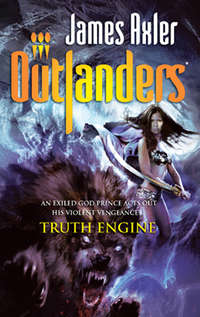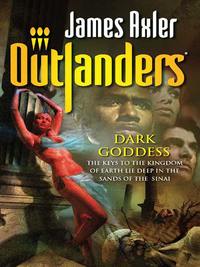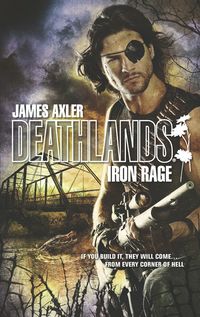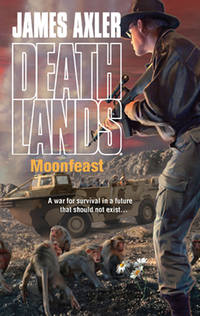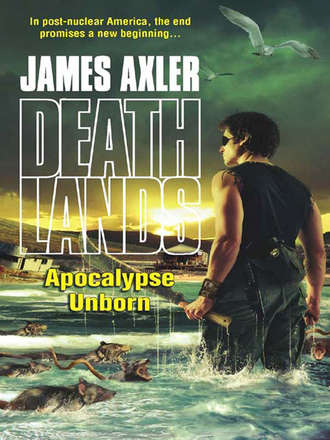
Полная версия
Apocalypse Unborn
In the PVC tubes propped up at the foot of his bunk the scagworms were dreaming, too. Their millipede legs twitched in hibernation sleep, their armored, eyeless, bullet-heads full of murderous bliss.
Kirby shouldered his M-16 and headed for the galley. He staggered as he hurried after the lanky man with the ebony walking stick. Kirby hadn’t gotten his sea legs yet.
Having found Doc Tanner at last, over such a distance of time and space, against astronomical odds, Kirby and Bell couldn’t bear to let him out of their sight, and in fact were keeping tabs on him in four-hour shifts. If the ancient academic fell overboard and drowned, if some ex-sec man suddenly took it into his head to shoot him in the back, all was lost forever. In the final months of the twentieth century the physicist and the mathematician had devised a second chance for their world. It was a last chance. There would be no subsequent zipping back and forth in time, working the problem on a trial-and-error basis, until they finally got things right. Each zip created an infinitesimal snag in present reality. When overlaid, the zips stretched the original snag into a hole, then a rip. The fabric of existence was far more delicate than anyone ever imagined.
The ship’s crew were the only takers for the breakfast of mixed fried small fish, squid, anchovies, herring and sardines were dropped whole by the bucketful into a wide caldron of boiling oil. After a minute or two, the floating, golden-brown clumps and clots were sieved out with a ladle and dumped in great mounds onto long enameled trays.
A one-course buffet.
Seated islanders hunkered over the tabletops, guarding their plates, eating bare-handed, warm grease running down their forearms.
The sight and the smell crushed what little appetite Kirby had. He climbed the companionway and went on deck. He stood for a moment, face into the wind, sucking down the cool, fresh air. To the northeast, turquoise sky was shot through with black wisps, the remnants of the chem storm they had endured. The orange disk of the sun was just breaking the horizon, above a thin, jagged ribbon of land. There was no way to tell how far they had come overnight; much of it had been spent without sails, bobbing in heavy waves. The sea all around was dark blue with a two-foot chop, scattered whitecaps and a blustery wind running from behind. The swell had fallen off to next to nothing.
He and Tanner weren’t the only passengers on deck, but they were among the few standing upright. Most of the others knelt in front of the scuppers, heads in hands, faces corpse-white, beards matted with dried vomit. Rainfall and sixty-degree seawater had melted the blue hail and washed away its residue. Ahead of him, Doc Tanner advanced to the bowsprit, the tails of his frock coat flapping in the breeze. That wasn’t all that was flapping. His long gray hair momentarily stood straight up, like one of those gee-whiz, static charge demonstrations.
Doc looked to be in his sixties, yet he was actually in his thirties. His forced jumps in time had produced intense submolecular stress. That Doc Tanner was not stark raving mad was testament to the resilience of the human spirit.
Though Dr. Antoine Kirby had arrived in the hellscape via cryotank, he faced the same stressors as the skinny Victorian—the same plus one. Doc was a blameless victim of circumstance; Kirby had helped facilitate the end of civilization. He entered cryosleep as an upper middle-class intellectual, a button-downed, closet-full-of-tailored-Italian-suits, Lexus-driving, happily-single, time-share-condo-in-Maui kind of whitecoat. A century as an ice block and four years fruitlessly roaming Deathlands had changed him beyond recognition. And not just externally.
Since his football days, Kirby had consciously repressed his own propensity for violence. He was a big, powerful, physically gifted man who hated aggression. He hated it because it was the easy way out. Because it was mindless and irrational. Because it contributed nothing to human understanding or betterment. The National Football League, which would have gleefully drafted him in the first round, sold diversion, sublimation and manipulation. That was something he wanted no part of. In his view, a life without a search for truth was a waste.
Thanks to cryogenics, the cerebral Dr. Kirby found himself thrust into a shattered and lawless world. He was suddenly forced to fight, and not just a dozen times a year on weekends, but almost daily. And not to win a game. In the process of some of these battles, he had taken human lives. Sometimes with his bare hands. To survive and further the vital mission, he had to unleash the demon within.
A case in point. Kirby and Bell hadn’t found the brood of scagworms they now carried. They had shared a cookfire with the pair of mutie hunters who’d found them, men they had buried the next morning in shallow graves hacked into the desert hardpan. The mutie millipedes gave them cover, identities, a way to get close their quarry without raising his suspicion, or the suspicion of his companions.
Dr. Theophilus Tanner was a classically educated man, which meant he was trained in science, history, logic, literature, mythology and dead languages. He had suffered terrible, unthinkable losses, yet stubbornly held on to life. Kirby and Bell knew they couldn’t force a man like Tanner into anything; and if they tried, their mission would fail, half completed. The action they required of him had to be performed of his own free will. There was no way around that fact. Accordingly, they had work with care and subtlety to convince him that it was the right and only thing to do. Before they could hope to do that, before they could reveal who they were and what the goal was, they had to gain his trust. They had already begun to lay the foundation.
It had come as a pleasant surprise to Doc Tanner that he and his new acquaintances had experiences in common. In their conversation the previous day, it turned out the mutie hunters had wandered the same territories, knew firsthand many of the villes, the baronies, the hazards Doc and the companions had faced. Tanner thought it was a coincidence—the small world syndrome.
It was not.
Kirby and Bell had been on the trail of the companions from the moment they were reanimated. They had picked up the scent by following tall tales, gossip and rumors from gaudy to gaudy, campfire to campfire. Then they had started tracking the carnage Tanner and the others left behind. It wasn’t just the size or wildness of the country that made the task so challenging. The companions had access to the predark network of mat-trans gateways, housed in nuke-safe, subterranean redoubts. Using this still-operational, automated technology, they could jump from coast to coast in a matter of nanoseconds. Though Kirby and Bell used the mat-trans gateways, too, arriving onsite even a day late meant the trail was already cold. Just when it had begun to seem like they were never going to close the gap, they got their lucky break.
For four long years Antoine Kirby had relied almost exclusively on violence and intimidation to advance his cause. Stifling his impatience as he approached the tall, skinny man on the bowsprit was difficult.
“By the Three Kennedys!” Doc exclaimed, pointing at the sea far ahead. “What in God’s name is that?”
Kirby followed the line of his arm and hand to a dark shape hanging above the distant wave tops. Long and slender, it was tapered at both ends. “It’s a bird, and a hell of a big one,” he said. “Wingspan has to be at least fifteen feet.”
“It’s flying against the wind,” Doc said.
And the wind was considerable. The creature was making no headway, but the ship was rapidly bearing down on it.
From the crow’s nest came the shout, “Manu tangata!”
“Manu tangata! Manu tangata!” The crew picked up the cry.
Captain Eng noted the position and turned the wheel for an intercept course.
The islanders rushed to the bowsprit, no longer taciturn and withdrawn. They laughed and spoke excitedly, slapping one another on the back and shoving one another playfully.
As the distance to intercept closed, Kirby could see the creature’s head was definitely lighter in color than its body or wings. Like a bald eagle. Only five times larger. With the ship traveling about fourteen knots and the bird thing essentially standing still, a collision was imminent.
At the last instant, the creature deftly angled itself to miss the half-dozen cables supporting the bowsprit. It crashed feet-first into the lowest of the foremast’s sails, momentarily tangling in the rigging. Flapping its great black wings, it dropped to the foredeck. Its yellow eyes were huge and terrified as it faced the gathered islanders. It opened its short beak and let out a piercing shriek of warning. Kirby could see small, sharp white teeth and a black tongue. It had no feathers on its face, which was uniformly pitted and pale. The head was entirely bald except for a tuft of downy-white fluff on its peak. The creature was not only exhausted from fighting the chem storm but clearly injured. It was missing flight feathers on its wings, and in places along their leading edges red bone showed through.
The crew immediately closed in and tried to test the extent of the damage. Gleefully, they lunged and feinted, trying to grab for it. The bird thing was very quick. Its snapping beak and the black talons on its long narrow feet kept the islanders at bay. It soon tired of the game and, avoiding their grasp, hopped and flapped back up into the foremast’s rigging. From this perch it looked down with dismay.
“I’ll get your birdy,” offered one of the passengers, a man so ground-in grimy that he looked like he had been sprayed with cooking oil then rolled in coal dust. He pulled a big black-powder handblaster from his rope-cinched trouser waistband. The .44-caliber single-action revolver was a predark reproduction, probably Italian, of the Walker model Colt, first manufactured in 1847. Four-plus pounds of case-hardened steel, and that was without bullets and powder. The man thumbed back the pistol’s hammer and, squinting along the barrel, took careful aim upward.
“Don’t shoot!” Eng bellowed as he barged through the massed spectators.
The would-be bird hunter paused, looking warily over his shoulder. Before he could lower his weapon, a belaying pin clonked him soundly on the back of the head. Steel pipe on a ripe coconut. As his knees buckled, the big pistol discharged straight up in the air. Thanks to the tail wind, the cloud of black-powder smoke lasted only seconds longer than the yard-long muzzle-flash. The beating of the unconscious man continued until the captain shouted for the crew to stop.
At Eng’s direction, islanders swarmed into the rigging, climbing above the creature, then onto the yard arms. From that vantage point, they managed to drop a heavy a net over it. Crew men waiting below caught hold of the net’s lines and pulled the thing screaming to the deck. It thumped and twisted, but it couldn’t get free. The islanders threw their bodies on top of it, forcing it onto its back. Then they grabbed hold of wings through the mesh, stretching them out to full length, kneeling on them to pin them to the deck.
Kirby saw curving, fingerlike extensions of bone on the ends of its wings. The index was nearly a foot long, the others much shorter. He was staring at its strange, birdman face when it threw back its head and spoke, jolting him to the core.
“Don’t do this!” it cried in a high clear voice. “I mean you no harm. I only want to rest for a little while. I have young ones. Without me, they will starve.” Then it made the lilting, musical sounds of the islander language, presumably repeating itself for those who didn’t understand English.
The crew paid it no mind. They seemed almost possessed. Grinning, laughing, they held down the great bird with brute force. One of them yanked a feather out of its wing and stuck the bloody quill in his coil of braided black hair.
“It is speaking!” Doc said, pressing forward. “This creature is intelligent!”
“No,” Eng told him. “Manu tangata is a stupid thing. It just repeats what it’s heard. It has no wairua, no soul.”
A conclusion the evidence seemed to contradict.
“Are you deaf, man!” Doc exclaimed. “It is sentient and it is talking to you!”
The captain glowered at him and snarled, “Porangi.”
Clearly not a compliment.
Doc tucked the lapel of his frock coat behind the tooled leather holster and his LeMat. The hulking captain stiffened.
A chill crawled up Kirby’s spine and into his scalp. Doc was about to intervene on behalf of the bird creature. It was something Kirby hadn’t anticipated. He knew how life in the hellscape had affected him, how its unrelenting brutality had inured him, bit by bit, to the suffering of others.
But this was no bluff.
The old man was about to let it rip.
Kirby leaned close, turning his back on Eng while he rested his hand heavily on the butt of the LeMat, blocking Doc’s draw. “Long odds on chilling them before they get you,” he whispered. “And if you do manage it, there’ll be no one to sail the ship. We’ll all die. This is a battle that can’t be won, mercie.”
Tanner looked at him for a long moment, then said, “It would seem a concession to barbarism and blind ignorance is in order.”
“Not the first,” Kirby said.
“Nor by any means the last,” Doc said, sweeping the large black hand off his gun butt.
From a bucket under a bench, a crewman produced a two-pound hammer and a fistful of four-inch, steel nails. From under a tarp, three other islanders hauled out a large, chipped and dented wooden cross. At the foot of its vertical member was a steel eyebolt. While the rest of the crew lifted, the trio of crossbearers slid it in place under the supine and helpless bird thing.
“Please, please,” it begged. “Don’t do this…”
The islanders ignored the desperate pleading. They continued to celebrate the capture, some danced around exuberantly, waving their black-tattooed arms in the air and thrusting their wide hips.
Kneeling on the deck, a crewman pounded spikes through the fattest part of the creature’s wing bones and deep into the wood. The creature squawked in agony at every blow. It squawked even louder when its feet were nailed together at the ankle joints. A line was attached to the eyebolt, and at a signal from the captain, crewmen began to hoist the cross, upside down.
Warm rain splattered the deck around them.
Blood drops
“Why me?” the bird thing moaned as it was jerked higher and higher. “Why me?”
“Manu tangata on the mast brings fair winds,” the captain explained, answering the question of a creature that could not think but only mimic.
The irony was lost on Eng.
Chapter Five
As morning progressed, the seas calmed and the wind dropped off. The swells became gentle and widely spaced. Around noon, Krysty Wroth started feeling well enough to struggle out of her bunk.
She walked into the galley, which was full of feeding islanders. The residual ache in her cramped stomach muscles and the sour taste of vomit in her mouth made her never want to eat or smell food again. The menu for lunch and dinner on the ship was the same as breakfast: deep fried, unboned, ungutted small fish and crustaceans. She had the choice of remaining belowdecks and watching the crew wolf the chow down with their fingers, or getting some fresh air. She chose fresh air.
Most of the passengers had recovered sufficiently to come out on deck. They sat and stood in singles and small groups. Subdued. Drained. Wary after the night of storms. They squinted in the bright sunshine, clearly out of their element.
Krysty picked Jak and Doc out of the crowd, but made no eye contact with them. Until they reached their destination, the other companions were to be treated as strangers. Krysty stepped up beside Mildred who stood at the port rail, amidships.
“How far have we come?” she asked the black woman.
“Not very,” Mildred replied. “Maybe a hundred miles or so. We had the sails down most of the night, going nowhere but up and down, up and down.”
“Where are we?”
“If Point Conception still existed, we would be grounded on the rocks right about now.”
Krysty gave Mildred a puzzled look. Like most Deathlanders, she knew little of the detailed geography of the predark West Coast.
Realizing the problem, Mildred explained. “All the tales about the southern half of California falling into the sea are true,” she said. “That ragged line of purple above the haze is what’s left of the Sierra Madre. They used to be fifty or sixty miles inland from the coast. The Pacific’s lapping on their flanks now. So far, it looks like everything south of Morro Bay is history. The cities of San Luis Obispo, Santa Maria, Lompoc are gone. There’s no sign of Santa Barbara, either. My guess is that the Soviets pounded the San Andreas Fault, well to the east of Los Angeles, with earth-shaker warheads. Deep surface detonations caused the fault to shift cataclysmically along its entire length, and the western plate sheared clean away. We’re talking maybe 350 miles of coast under water.”
As Krysty stared toward land, she could see scattered pillars of smoke rising from the surface of the glassy sea. In some places, it was white and opaque like steam; in others it was black and dense like oil fire smoke. The steady onshore breeze was blowing it away from them in seemingly endless low plumes to the distant mountains. Even so, the air smelled faintly of rotten eggs and brimstone. “How far did it all sink?” Krysty said.
“No telling how deep the water is between here and those mountains. Deep enough to submerge all signs of human habitation, for sure. It’s like no one ever lived here.”
“What’s burning on the sea?”
“It’s not really burning,” Mildred said. “Those clouds are from volcanic vents and fumaroles. The white steamers are on the sea floor. The black smokers are on seamounts just under the surface. They must have opened up along the fault and deep fracture lines, post-cataclysm. The clouds are created when cool seawater makes contact with superheated gases and molten lava. Some of it’s bound to be highly corrosive, full of concentrated sulfuric and nitric acid. Get a lungful of that stuff and presto, no more lungs.”
“Good thing the wind is pushing it away from us.”
Scanning the sea Krysty saw a mature tree, floating about seventy-five yards away, presumably uprooted whole and blown into the ocean by the chem storm. Branches and leaves trembling, it moved along with them. Then, apparently of its own accord, it abruptly reversed direction. A sucking, roaring sound grew louder and louder. “What in the rad blazes?” the redhead exclaimed, grabbing the cables and climbing up on the gunwhale for a better look.
Mildred scrambled up alongside her.
The oak tree glided in a foaming circle, picking up speed as it spiraled inward toward a shifting, dark core. A black hole. Krysty could see the tree wasn’t alone. Other debris was caught in the powerful current. White plastic bags. Plastic bottles. Coils of seaweed. Bits of paper. A half sheet of delaminating plywood.
The crew on the port side shouted urgently back at the helm, waving their arms for the captain to change course.
As Eng brought the rudder hard over, Krysty saw a line of similar whirlpools that stretched on for miles, paralleling the redefined coast. The floating garbage had no chance. Swirling, roaring funnels of black inexorably drew everything to their centers. Some of the vortexes were big enough to pull down house trailers.
Or sailing ships.
Captain Eng gave the whirlpools plenty of room, steering for the low island. His course set, Eng pulled a wad of white cotton batting from his pants’ pocket, tore off a couple of sizable hunks, and thumbed them up his wide nostrils.
The rest of the crew was following suit, plugging their noses with cotton wads. This done, they began passing out plugs to the male passengers.
“What’s that for?” Krysty asked an islander handing out cotton.
“Not for you,” was all the answer she got.
“If there’s danger, we want some, too,” Krysty told the man, holding out her hand.
“No danger for you. You are safe. So is she.” The crewman quickly moved on, ripping the batting into small tufts.
Krysty started to follow him and insist, but Mildred stopped her. “If there’s some kind of poison in the air, nose plugs made of cotton aren’t going to help us, anyway,” she said. “Look around. Nobody’s covering their mouth. It makes no sense. Breathing toxics or corrosives through your mouth will get you just as dead as breathing them in through your nose.”
“If it isn’t poison or acid, then what is it?”
“Your guess is as good as mine.”
“What do you suggest?” Krysty asked. Up near the bow, Ryan was accepting a pair of nose plugs from a crewman.
“Wait and see how it plays out…” Mildred said.
Avoiding the suckhole obstacle course brought the ship to within a hundred yards of the island’s shore. Closer in, deep blue water shoaled, changing to a light turquoise color. The island’s summit was a rounded, low mound of sun-blasted rock and dirt. Below an eroded bluff a broad, shallow cove was fronted by a narrow beach. Along the base of the cliff stood four crude stone huts with no glass in the windows and no doors.
“I can’t tell which island it is,” Mildred said. “There’s so little left of it. It has to be one of the bigger ones, though. Either Santa Cruz or Santa Rosa.”
The breeze sweeping across the island carried the scent of perfume, although there was no evidence of flowering plants. Indeed no evidence of plants of any kind. The scent got stronger and stronger.
“Ooof!” Krysty exclaimed, instinctively averting her face and covering her nose with her hand.
The odor was pungent and cloyingly sweet. Like rotting fruit.
When Krysty looked back at the shore, she saw white forms eerily rising from the beach stones. Human forms. Four beautiful, young, naked women beckoned languidly, invitingly, holding out what looked like plates heaped with food and pitchers of drink.
The male passengers along the rail were drop-jaw riveted by the sight; some were obviously sexually aroused, pitching tents in their BDUs.
“Men can be such triple stupes,” was Krysty’s comment.
“It’s not their fault,” Mildred said. “There must be something in the perfume.”
“It’s not doing anything for me…”
“Me, either,” Mildred said. “The islanders seem unaffected, too, maybe because they know what to expect, or how to fight it. That scent must contain pheromones, chemicals that selectively stimulate the male of the species. Look around. Our fellow passengers are getting turned on, despite the nose plugs. Dammit, that island’s giving off aerosolized Viagra.”
The crew stepped in before things got way out of hand. They brutally shoved the dazed men to the starboard side of the ship, and forced them at blasterpoint to look the other way.
“Atarangi,” a passing islander told Krysty, gesturing at the beach with a collapsible brass spyglass. “Not what they seem.” He opened the telescope and offered it to her.
When she looked through the lens, she saw the lovely faces were not faces at all. Blotches of dark pigment formed seductively lashed eyes and smiling mouths. They had discernible heads, necks, breasts, waists, hips only from a distance. Up close, they were just white oblong shapes, ingeniously shaded to look human. Their long flowing hair was made up of frantically waving filaments, like the tendrils of albino sea anemones. The plates of food held colored rocks; the jugs were empty.
“Not real wahines,” the islander said. “Set foot on the beach, you find that out, quick. Looks like four, but there’s only one. They are fingers on a hand that hides beneath the sand and rocks. Hand is evil. Its smell is sweet and loving but it eats men. Sucks the blood and marrow from their bones.”



